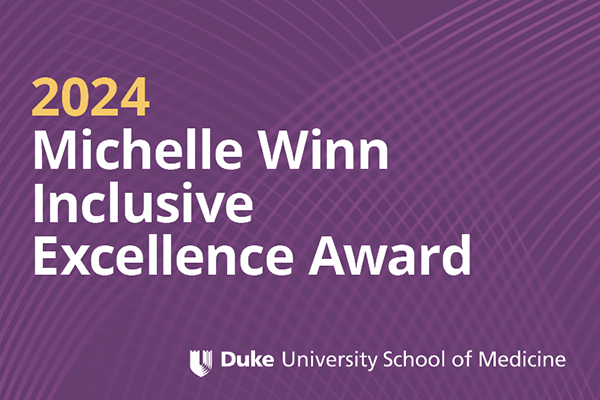
The Duke University School of Medicine has announced the 2024 Michelle P. Winn Awards honoring individuals and teams who have made significant contributions to diversity, equity, and inclusion over the past year.
The recipients of the 2024 Michelle P. Winn Inclusive Excellence Award are:
- Kenisha Bethea, Research Program Leader, Duke Clinical and Translational Science Institute (Staff Award)
- Anivarya Kumar (Student Award)
- Kenyon Railey, MD, Associate Professor in Family Medicine and Community Health (Faculty Award)
- iMIND Research Team (Team Award)
The Winn Awards will be presented at the 2024 Equity Advancement Symposium on August 5.
Kenisha Bethea: Staff Award

Kenisha Bethea is a research program leader with the Duke Clinical and Translational Science Institute’s Community Engaged Research Initiative (CERI) and strives to make Duke a more inclusive and community-driven health care institution, most notably through her work with the AME Zion Health Equity Advocates & Liaisons (HEAL) Partnership. For the past seven years, she has led the work of HEAL, which seeks to enhance health care outcomes and champion health equity within the African American community across the entire state of North Carolina.
During the height of the pandemic, Bethea and the HEAL Partners mobilized communities for vaccinations, testing, and treatment education for COVID-19. She also organized webinars for congregates across the state to support hundreds of churches on safe operations to reduce the risk of COVID-19 infections and to navigate communities to vaccinations and testing.
Her impact on advancing diversity in clinical research expands beyond her work with CTSI. She is a board member for the Community and Family Life & Recreation Center at Lyon Park, which is a vital host site for Duke Primary Care.
Bethea mentors students through the Durham Tech Research Equity Scholars program and is an internship mentor for public health education students at North Carolina Central University.
“Her unwavering commitment to fostering community-driven health care solutions and
championing diversity aligns with the life and legacy of Dr. Michelle Winn,” wrote Leatrice Martin, MBA, CHES, project planner for CERI, in Bethea’s nomination. “Kenisha has not only expanded access to health care in Durham and North Carolina but has also cultivated a culture of equity and inclusion that resonates throughout the Duke and Durham community and the Duke Research Enterprise.”
Anivarya Kumar: Student Award

Throughout her time as a student at Duke University School of Medicine, Anivarya Kumar, who recently completed her third year, has been an advocate for equity in education, patient care, and the community.
Kumar focused her third-year research project on using machine learning to improve health care documentation and patient information, seeking to make it more understandable and inclusive. The project was inspired by her childhood experiences in simplifying words and phrases for her family as a first-generation American as well as her clinical interactions with patients struggling to manage health conditions they could not understand. She was awarded $10,000 in grant funding to expand this work into the community and partner with health care providers of traditionally underserved patient populations.
Serving as the course facilitator for the school’s Humanities for Health Justice course, Kumar built a medical student learning curriculum that creates a platform for sharing inequities and
disparities observed in clinical settings as well as a think tank for solutions to overcome these challenges.
Jennifer M. Lawson, MD, MA, assistant professor in pediatrics, worked with Kumar on the course. In her nomination letter, she wrote that Kumar “continues to weave her interests in health equity and humanities in a multitude of thoughtful, innovative, and impactful ways. She sees issues of health equity and gaps in communication in her training and actively seeks innovative strategies to address them.”
As co-president of the Oncology Student Interest Group, Kumar helped organize an annual panel discussion called “Disparities in Cancer Care” and hosted several community service projects aimed at serving low-income cancer patients in Durham. She also is the founder of HumTech & Health, where she is developing an international research mentorship program that empowers underrepresented high school and undergraduate students to carve their own path in health care through humanities, technology, and medicine.
Kenyon Railey, MD: Faculty Award

For more than a decade, Kenyon “Kenny” Railey, MD, has been a dedicated leader working to enhance equity, diversity, and inclusion both within his department and throughout the School of Medicine. Railey is currently an associate professor in the Department of Family Medicine and Community Health and medical director of the Duke Physician Assistant Program.
Railey took on his first role in EDI 11 years ago when he became the diversity strategist in the Office of Diversity and Inclusion (now the Office of Equity, Diversity and Inclusion). He was later promoted to assistant chief diversity officer in 2017 and held the position until 2020. Railey went on to cochair the School of Medicine’s Anti-Racism Steering Committee as part of the Moments to Movement initiative.
In his various roles, Railey strives to reduce bias, health care disparities, and inequalities in patient care, education, and research. A highly regarded and sought-after lecturer, he speaks locally and nationally on numerous EDI topics, including anti-racism, implicit bias, cultural humility, sexual and gender diversity, and health equity.
He was the founding course director for the school’s Cultural Determinants of Health Disparities class. The innovative curriculum has been a model for other schools in the country. He also has mentored many students and colleagues.
Nominator Andrew Spector was among those mentored by Railey. Spector, associate professor of neurology and vice chair of inclusion, diversity, and empowerment in the Department of Neurology, credits Railey with inspiring him to get involved in EDI work. “Somehow, amid everything else he has done, Kenny has found time to be a mentor, uplifting many colleagues, from both underrepresented and majority groups,” Spector wrote.
iMIND Research Team: Team Award
Led by Sharon Fekrat, MD, FACS, FASRS, and Dilraj Grewal, MD, FASRS, from the Department of Ophthalmology, iMIND Research Team has taken a unique, multidisciplinary approach to enhancing equity and diversity in clinical trials and medical education and training.
iMIND is made up of Duke undergraduates, medical students, ophthalmology residents and fellows, and faculty from several departments. The team’s research involves using eye multimodal imaging to detect and diagnose neurodegenerative disease, including studying gender and racial differences.
They have worked to educate and engage the local community about clinical research to promote diversity in clinical trial cohorts. Their team has produced several national surveys that examine gender, racial, and other potential biases experienced by premedical and medical students, as well as physician residents across the United States. They have also assessed diversity trends in ophthalmology residents over the last decade and analyzed endowed chair allocation across academic institutions to improve equity.
In her nomination letter, Durga Borkar, MD, assistant professor of ophthalmology, praised the team for its innovation: “Their far-reaching initiatives and unwavering commitment to advancing diversity, equity, and inclusion serve as an example to others within the broader School of Medicine. Their innovative efforts highlight the inclusive thinking exemplified at Duke.”

iMIND Team:
Duke undergraduates
Sejal Patel, Disha Jotsinghani, Annabel Stickel, Alice Haystead, Sanjana Anand, Alexander Richardson, David Bearden, Raj Kundu
Duke MBS student
Lucas McNeill
Duke medical students
Suzanna Joseph, Ariana Allen, Jay Rathinavelu, Jamie Karl, Hemal Patel, Peter Weng, Josh Woo, Wufan Zhao, Alex Choi, Liz Fan, Camryn Thompson, Meredith Cox, Anita Kundu, Angela Hemesath, Praruj Pant, Lily Fahs, Lulu Wein, Claire Washabaugh, Nathan Luzum, Shweta Lodha, Grace Kim, Nicole Schindler
Duke ophthalmology residents
Hazem Mousa, MD; Naveen Karthik, MD; Terry Lee, MD; Cason Robbins, MD; Emily Jung, MD; Sri Meghana Konda, MD; Yuxi Zheng, MD; Richmond Woodward, MD; Aaron Lindeke-Meyers, MD; Richard Morgan, MD, PhD
Duke Faculty
Andy Liu, MD; Kim Johnson, MD; Burton Scott, MD, PhD; Ricardo Henao, PhD; Sandra Stinnett, DrPH; Dilraj Grewal, MD, FASRS; Sharon Fekrat, MD, FACS, FASRS
About the Winn Awards
The Office of Equity, Diversity and Inclusion established the Michelle P. Winn Inclusive Excellence Award in 2016 to recognize individuals who have made significant contributions to diversity and inclusion within the Duke University School of Medicine community. The award is named for Michelle P. Winn, MD, associate professor of nephrology in the Department of Medicine, who passed away in July 2014. Winn was respected and beloved by her colleagues and deeply committed to diversity and inclusion and to the careers of younger physicians and scientists who orbited around her.